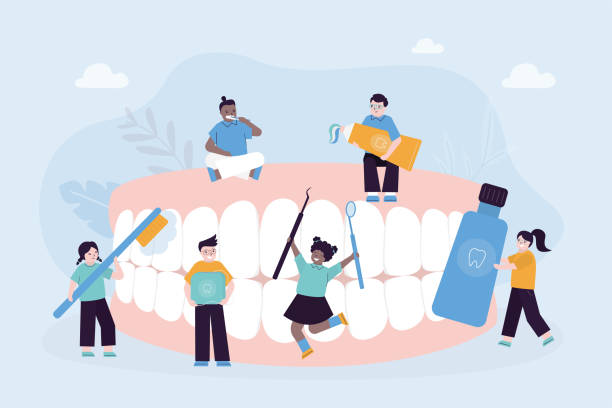Key Takeaways
- Integrating straightforward daily habits is critical for sustaining outstanding oral health and a radiant smile.
- Consistent oral care practices prevent dental issues while supporting overall well-being.
- Comprehensive oral health education imparts enduring benefits for both younger and older populations.
Embracing and sustaining optimal oral health is essential for boasting a captivating smile and nurturing overall health and well-being. Incorporating consistent daily habits into your lifestyle can significantly boost your oral hygiene, defend against various dental issues, and establish a solid foundation for enduring health. By grasping the importance of oral hygiene in daily life, individuals are empowered to seamlessly weave oral wellness practices into their everyday routines, supporting a holistic and balanced approach to health.
The advantages of dedicated oral care extend well beyond purely aesthetic benefits. Oral health interplays closely with general health, pivotal in averting systemic issues such as cardiovascular diseases, enhancing diabetes management, and even contributing to mental health stability. This profound connection between oral health and overall well-being underscores the importance of integrating dental wellness as a fundamental component of a comprehensive health strategy. As the age-old saying states, “A bit of prevention is worth a lot of cure,” emphasizing the lasting benefits of proactive preventive care.
The Importance of Daily Oral Hygiene
Championing daily oral hygiene is pivotal in warding off dental ailments such as cavities and gum disease. Regular brushing and flossing are primary defenses against plaque—a persistent biofilm saturated with bacteria that can lead to severe dental complications. Adopting steadfast oral hygiene routines fortifies dental health and markedly enhances general health, potentially precluding secondary conditions like cardiovascular diseases. This intrinsic relationship underscores the requirement for pervasive public awareness and education on oral health’s vital role in our comprehensive well-being.
How to Brush and Floss Effectively
Brushing Techniques
Perfecting effective brushing hinges on mastering the correct technique. It involves positioning your toothbrush at a 45-degree angle to the gumline, employing gentle, circular motions to remove debris and plaque efficiently. Allotting two minutes twice daily to brushing can dramatically bolster oral health management. Moreover, safeguarding your oral care toolkit by replacing your toothbrush every three to four months—or sooner if bristles exhibit signs of wear—is paramount to maintaining consistent dental performance and protection.
Flossing Tips
Flossing, a crucial yet frequently overlooked component, is essential for comprehensive oral care. It reaches interdental zones that are inaccessible by a toothbrush. Using around 18 inches of dental floss, maneuver it gingerly between teeth, adhering to a C-shaped contour around each tooth. This recurring practice is indispensable in warding off plaque accumulation, safeguarding gum integrity, and mitigating the risk of periodontal diseases. Excelling in regular flossing techniques significantly magnifies the efficacy of your oral care regimen.
Choosing the Right Oral Care Products
Given the vast assortment of oral care products, informed decision-making is pivotal for effective dental hygiene. Opt for a soft-bristled toothbrush with a rounded head to safeguard gum and enamel health. Opting for fluoride toothpaste is crucial, as it fortifies enamel and delivers superior protection against tooth decay. Mouthwashes contribute additional benefits by diminishing oral bacteria levels. Understanding and selecting products tailored to individual dental needs reinforces the overall efficacy of oral care.
Healthy Eating for Strong Teeth
The impact of a balanced diet on dental health is profound and cannot be underestimated. Consuming a nutrient-rich diet fortifies dental resilience, particularly through dairy products that provide essential calcium and crunchy fruits and vegetables that naturally sanitize teeth surfaces. Concurrently, moderating the consumption of sugary and acidic foods is vital, as they can potentially erode enamel and foster cavities. Incorporating nutritional strategies for dental health is foundational for preserving strong teeth throughout life, engendering a symbiotic relationship between dietary habits and oral health.
Regular Visits to the Dentist
Consistent dental appointments are imperative for sustaining preventive care. These check-ups allow dentists to identify potential issues early and provide professional cleanings that eliminate tartar buildup beyond the reach of everyday at-home care. Regular dental visits—traditionally every six months—enable prompt identification and response, stopping small problems from developing into major issues. If you encounter persistent discomfort or gum bleeding, swift, professional intervention can avert more severe complications, underscoring the necessity of proactive dental care management.
Teaching Children Healthy Oral Habits
Engaging children in oral care routines can be a gratifying exercise that nurtures lifelong habits. Introducing colorful, character-themed dental tools can ignite excitement and motivation. Encouraging regular family brushing rituals can foster mimicry and establish enjoyable family bonding moments centered on dental care. Praising their efforts further augments their enthusiasm for oral hygiene, embedding positive habits early that they’ll embrace throughout their lives. Guiding children in this direction lays a strong foundation for healthy smiles into adulthood.
Dealing With Common Oral Problems
Many individuals will encounter common oral problems, such as sensitivity, bad breath, and dry mouth. Address these challenges with consistent, thoughtful oral care practices and lifestyle modifications to ameliorate symptoms. For instance, toothpaste formulated for sensitivity can alleviate discomfort while maintaining hydration, which helps manage dry mouth. Persistent issues should always be evaluated and addressed with professional guidance to ensure effective management plans meticulously tailored to individual needs, optimizing oral health outcomes.
Long-Term Strategies for Oral Wellness
Attaining long-term oral wellness necessitates adopting consistent practices that transcend brushing and flossing. Consider the impact of lifestyle choices on oral health: chronic stress can lead to bruxism (teeth grinding), while smoking and excessive alcohol consumption exacerbate gum disorders. Embracing holistic health approaches—such as effective stress management techniques and refraining from harmful substances—lays the groundwork for sustaining a lifetime of oral health. This holistic perspective illustrates that personal choices are the building blocks of a sustainable approach to oral wellness, fostering resilience in oral and overall health.


